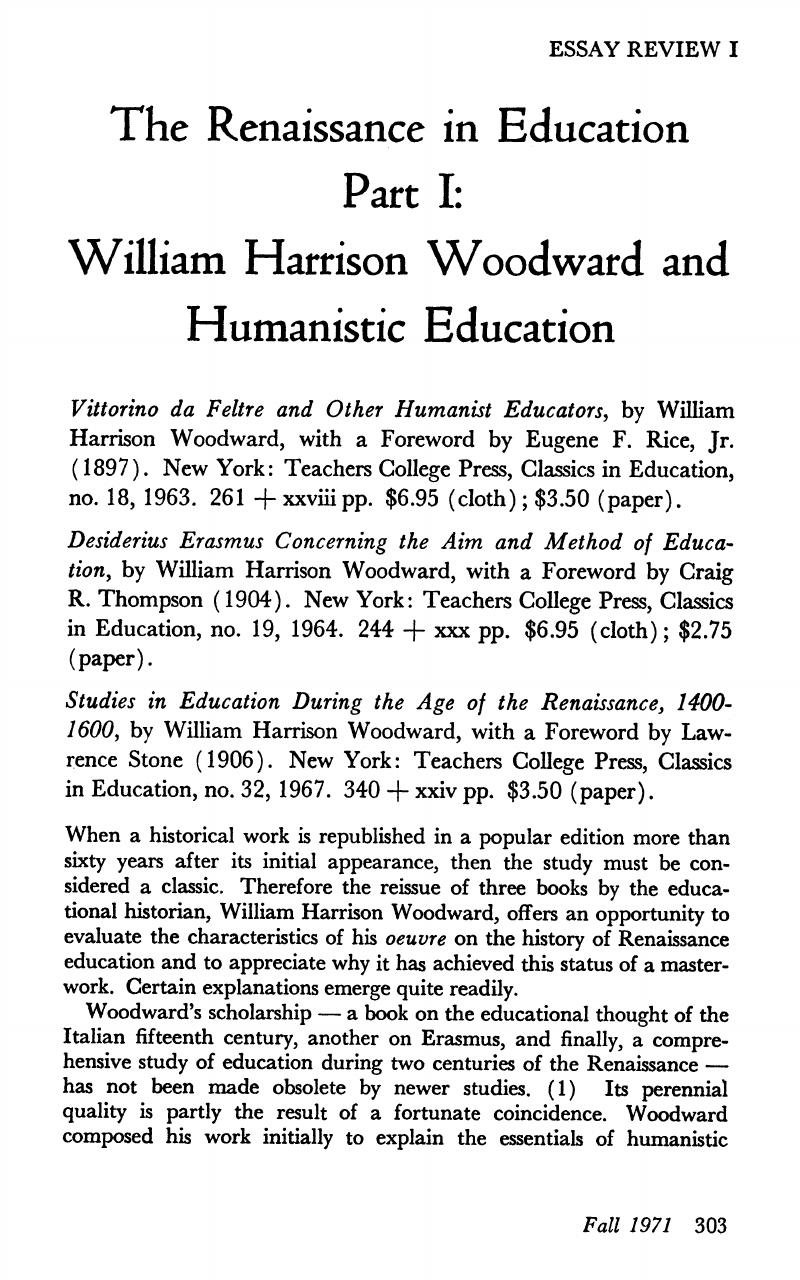No CrossRef data available.
Article contents
The Renaissance in Education Part I: William Harrison Woodward and Humanistic Education - Vittorino da Feltre and Other Humanist Educators, by William Harrison Woodward, with a Foreword by Eugene F. RiceJr. (1897). New York: Teachers College Press, Classics in Education, no. 18, 1963. 261 +xxviii pp. $6.95 (cloth); $3.50 (paper). - Desiderius Erasmus Concerning the Aim and Method of Education, by William Harrison Woodward, with a Foreword by Craig R. Thompson (1904). New York: Teachers College Press, Classics in Education, no. 19, 1964. 244 + xxx pp. $6.95 (cloth); $2.75 (paper). - Studies in Education During the Age of the Renaissance, 1400–1600, by William Harrison Woodward, with a Foreword by Lawrence Stone (1906). New York: Teachers College Press, Classics in Education, no. 32, 1967. 340 + xxiv pp. $3.50 (paper).
Published online by Cambridge University Press: 24 February 2017
Abstract

- Type
- Essay Review I
- Information
- Copyright
- Copyright © 1971 History of Education Quarterly
References
Notes
1. Harrison Woodward, William, Vittorino da Feltre and Other Humanist Educators (1897; reprint ed., New York: Teachers College Press, 1963); Desiderius Erasmus Concerning the Aim and Method of Education (1904; reprint ed., New York: Teachers College Press, 1964); Studies in Education During the Age of the Renaissance, 1400–1600 (1906; reprint ed., New York: Teachers College Press, 1967).Google Scholar
2. Woodward, Studies, p. 40. See also p. 48: It is at once the attraction and the difficulty of the historical study of Education that the subject can only be rightly understood as an aspect of the social and intellectual conditions of a given age. To isolate the questions which revolve round Universities and schools, their aims, curricula and organisation, from their inevitable dependence upon the historical environment, and from the interests, intellectual and spiritual, which occupied contemporary men, is to deprive the educational facts themselves of the clue to their meaning.Google Scholar
3. Woodward, Studies, p. 37.Google Scholar
4. In Woodward's paraphrasing of Declamatio de pueris, the following statement appears, which is of interest to scholars familiar with Philippe Ariès' thesis on the early modern discovery of childhood. Erasmus noted: “Wholly wrong are those masters who expect their little pupils to act as though they were but diminutive adults, who forget the meaning of youth, who have no standard of what can be done or be understood except that of their own minds” (Woodward, Erasmus, p. 211).Google Scholar
5. Erasme, Declamatio de pueris statim ac liberaliter instituendis, étude critique, traduction et commentaire par Jean-Claude Margolin (Geneva: Droz, 1966), pp. 20, 23–28; the editor places the date of composition in ca. 1509.Google Scholar
6. McConica, James K., English Humanists and Reformation Politics Under Henry VIII and Edward VI (Oxford: Oxford University Press, 1965), pp. 14–34.Google Scholar
7. Woodward, Studies, p. 90.Google Scholar
8. Woodward, Erasmus, p. 40.Google Scholar
9. Woodward, Erasmus, p. 35.Google Scholar
10. Bataillon, Marcel, Erasme et l'Espagne (Paris: Droz, 1937).Google Scholar
11. McConica, , English Humanists pp. 35, 53–55, 63.Google Scholar
12. Burckhardt, Jakob, The Civilisation of the Period of the Renaissance in Italy trans. Middlemore, S. G. C. (London: Swan Sonnenschein & Co., 1892).Google Scholar
13. Woodward, Studies, p. 2.Google Scholar




